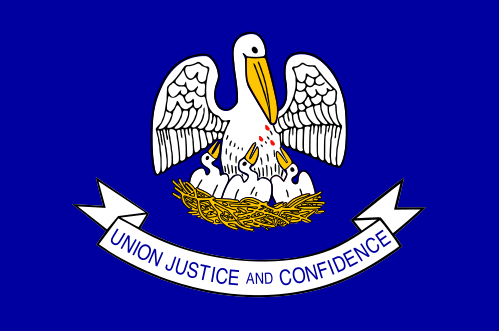United States
Louisiana : Union, Justice, Confidence

Louisiana is a state located in the southern region of the United States. Louisiana is the 31st most extensive and the 25th most populous of the 50 United States. Louisiana is bordered by the state of Arkansas to the north, Mississippi to the east, Texas to the west, and the Gulf of Mexico to the south.
Louisiana has a diverse culture, with influences from French, Spanish, African, Native American, and Cajun cultures. Louisiana is known for its music, food, and architecture. Louisiana is also home to many festivals, including Jazz Fest and Mardi Gras.
Louisiana has a humid subtropical climate and experiences long summers and short winters. Louisiana is susceptible to hurricanes and tropical storms due to its location on the Gulf of Mexico. Louisiana is also home to the Atchafalaya Basin, the largest wetland in the United States.
Louisiana has a long history of racism and discrimination. Louisiana was a slave state prior to the Civil War, and Jim Crow laws were enacted after the war to keep African Americans from receiving equal rights. Louisiana was also the site of the Louisiana Purchase, which resulted in the forced displacement of Native Americans. Louisiana has a large African American population, and racism is still a problem in the state today. Louisiana has made some progress in recent years, but there is still much work to be done to combat racism and discrimination in Louisiana.
Racism has been a persistent issue in Louisiana, and its effects on black people have been long-lasting and devastating. Despite Louisiana’s rich history and diverse culture, black people have experienced discrimination, prejudice, and injustice in various areas of their lives, including housing, education, employment, and criminal justice.
One of the most significant effects of racism on black people in Louisiana is housing segregation. Many black people in Louisiana live in impoverished and segregated neighborhoods, with limited access to basic resources and services. This has resulted in a lack of economic opportunities, poor living conditions, and limited educational and social opportunities.
The education system in Louisiana has also been affected by racism. Historically, black schools in Louisiana were underfunded and had fewer resources than white schools. This led to a significant achievement gap between black and white students, and black students were often denied access to quality education. Even today, black students in Louisiana still face systemic barriers in education, including a lack of resources, underfunding, and discriminatory practices.
In Louisiana, black people are also disproportionately affected by poverty and unemployment. The poverty rate for black people in Louisiana is significantly higher than that of white people. This is due in part to the lack of economic opportunities available to black people, as well as systemic racism in hiring practices and employment opportunities. Many black people in Louisiana also face discrimination in the workplace, which limits their ability to advance professionally.
The criminal justice system in Louisiana is another area where racism has had a profound effect on black people. Black people in Louisiana are more likely to be arrested, convicted, and incarcerated than white people. They also receive harsher sentences and are more likely to be subjected to police brutality and other forms of abuse. This systemic racism in the criminal justice system has resulted in the mass incarceration of black people in Louisiana, which has had a devastating impact on families and communities.
The effects of racism on black people in Louisiana are far-reaching and long-lasting. Black people in Louisiana have faced discrimination and prejudice in many areas of their lives, including housing, education, employment, and criminal justice. This systemic racism has limited their opportunities, harmed their mental and physical health, and created generational poverty and inequality.
SUNDOWN TOWNS IN LOUISIANA
Sundown town, in U.S. history, a town that excluded nonwhite people—most frequently African Americans—from remaining in town after sunset.
Here is a current list of sundown towns in Louisiana. This list has been created by Tougaloo College in Tougaloo, MS. This list is a work in progress. Some cities have been confirmed as sundown towns and some are listed for other or similar reasons.
Anacoco
Golden Meadow
Grand Isle
Jean Lafitte
Krotz Springs
Pitkin
Pollock
Simpson












You must be logged in to post a comment Login